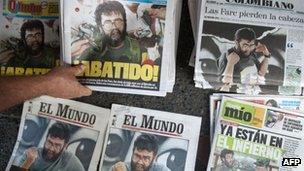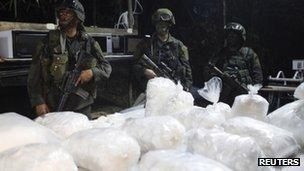Colombia President Juan Manuel Santos: Help us fight drugs
- Published
President Santos of Colombia says drug use in cities like London and New York threatens his country's national security
There are few world leaders who can boast a higher popularity rating at the moment than Juan Manuel Santos, just 15 months in the job as Colombian president.
The economy is booming, rebels from the Revolutionary Armed Forces of Colombia (Farc) appear to be a spent force, and big drug cartels no longer hold sway.
In addition, laws have been passed to give land back to the displaced and reparations to victims of the long-running civil conflict.
President Santos has also been praised for the arrest, while he was defence minister, of senior generals implicated in human rights abuses.
And he is not just popular at home: after years of delay, the US Senate last month passed a free trade agreement with Colombia; China is buying up Colombian nickel and coal; and a European trade deal is due to be ratified next year.
President Santos is visiting London this week, a place he calls his "second home", to talk business and to build what he hopes will be a "special relationship" with Britain.
"There are many things we can do together. Colombia has many of the things the UK needs and the UK has many of the things we need," he said in an interview with the BBC ahead of his trip at the presidential palace in Bogota.
With an economy growing by 4-5% a year - and predicted to continue at that pace for a decade - he is in a strong position.
But Mr Santos is the first to admit Colombia still has a drugs problem.
"As long as people in the UK sniff coke - or in New York or Paris - we will suffer here and this is a problem for us of national security because this is what funds all the illegal groups.
"We would very much like more collaboration and co-responsibility from other countries, as this is not a war that Colombia can win by itself."
Long game
Violence is still widespread and the murder rate remains high in some parts of the country.
Local papers in Antioquia province, a major drug-trafficking corridor, are filled with pictures of dead gang and militia members, as well as ordinary people caught up in the violence.

Beginning of the end? Cano's death made front page news in Colombia
But after five decades of conflict, the Farc guerrillas are far from being the force they were when they controlled a third of the country.
On 4 November, its bookish and bespectacled leader Alfonso Cano was killed in a military operation - a major blow to the organisation.
"The Farc are strategically and militarily defeated," said Antonio Lopez, a former member of a rebel group and now president of the Nuevo Arco Iris (New Rainbow) think-tank.
"Not only because they've lost their political goals, which are fuzzy now, but also because the state forces have a clear strategic advantage that the Farc cannot overcome.
"People used to say time was with them, but I believe time is now against them. The more they wait, the weaker they will be at the negotiation table."
Friends again
Better intelligence has pushed Farc troops up to and over the border with Venezuela, but insurgent attacks continue with roadside bombs, mines and ambushes targeting the authorities.
"We have a comprehensive approach," President Santos said.
"We use military pressure and at the same time have taken out their political backing. Politically they are defeated, militarily they are not defeated, but are weakened.
"We are taking away their arguments to maintain their war, starting many of the things they wanted for this country, for example the restitution of land to the peasants, the reparation of the victims, a very aggressive social policy."
The laws have been passed, but implementing a programme involving four million victims of the long years of fighting will be a huge task.
"The challenge of implementing post-conflict measures while there's still conflict" is how some analysts see it.
Three years ago, Colombia's fight against the Farc threatened to draw in neighbouring countries.

Cocaine production has fallen significantly in Colombia, according to UN figures
The perceived safe haven the Farc and other rebel groups enjoyed in Venezuela saw diplomatic ties severed.
A bombing raid on a Farc camp inside Ecuador saw both Ecuadorean and Venezuelan troops mobilised on their borders with Colombia in response.
But President Santos moved quickly after taking office in August 2010 to repair relations with some of Colombia's neighbours, which had seriously deteriorated under former President Alvaro Uribe.
His more open approach has led to heavy criticism from Mr Uribe, who was not only once his boss but also backed him in the election.
"I have a mantra and I meditate on it every day," Mr Santos said. "Don't fight with Uribe. It's not good for him, it's not good for me.
"He feels I have a different style, but we have very similar objectives. He wants to fight me, but I don't want to fight with him. I have respect and gratitude for him and hopefully this will be over soon."
But at the same time as he plays down talk of a rift with Mr Uribe, President Santos is clearly set on being his own man - a stance that seems to be working as he basks in approval ratings above 80%.
- Published10 November 2011
- Published6 November 2011
- Published4 October 2012
- Published25 May 2011
- Published13 October 2011